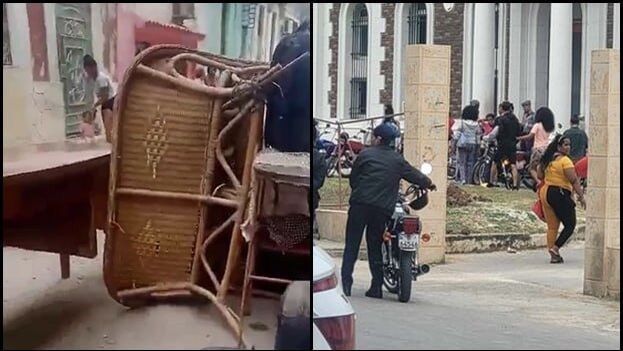
Those thrown out have a month to collect their things from the warehouse where the local authority put them.
By Juan Diego Rodríguez (14ymedio)
HAVANA TIMES – “Easterners, gay AIDS patients, the elderly, women with their husbands, children and people who have nowhere to live,” is how Yunier, one of those evicted from Factoría 70 between Corrales and Apodaca in Old Havana, described the situation of the people who were evicted on 31 January because the building was in danger of collapsing. “They dragged us all out of the place like dogs”.
The nearly one hundred people who were illegally occupying some 26 rooms in the building were evicted by the police and several local government officials, Yunier says. They were mistreated and given no assurances, although not all versions of what happened coincide. “They told everyone to find by themselves places to stay. They told them to go back to where they came from. The only thing they set up was a warehouse to store things while we found a place”, says the Havana native.
The evictees’ belongings can only stay there for a month, Yunier explained. The young man remembered how, about three years ago, people began to move into the the building, which had been declared uninhabitable by the authorities. “The people who were moving in began to put up windows and doors, and to organise the rooms a bit. Almost all were from Santiago de Cuba and Guantánamo, although there were some from Havana”. The former inhabitants of the building, he said, had previously been moved to shelters.
He said that none of the people living in Factoría 70 received any eviction notices. The police arrived on 31 January, asked the residents for their ID cards and took them to Dragones station. “They handed out fines and let us go, and said they were going to come back another day, but they showed up the same day at five in the afternoon,” Yunier recalled. “The police wanted to finish before dawn, so that none of this would get out and people wouldn’t notice. The one who said we had to leave was a policeman from Dragones”, saids the young man. “Agents on motorbikes and other vehicles arrived,” as well as a government superintendent from Old Havana who did not identify himself. Five other officials with him also did not give their names..
The eviction was tense, said Yunier. “They threatened us. They said that if we didn’t leave they were going to do bigger things”. Homosexuals got the worst of it and were threatened by the officers: “You shut up. You are birds and we don’t want your comments. Similar things were said to the people from Santiago and Guantánamo, who were told that they “should go back to the East”.
Now the evictees are worried about what will happen to their belongings in the “goods warehouse” where the local government stored them. “So far nothing has been lost, but they might be,” he said.
The person who stands to gain most from the emptying of the building is, Yunier guessed, the president of the Committee for the Defence of the Revolution (CDR) on the block where Factoría 70 is located. The Havana native identifies him as Santiago, owner of a hostel and a pink convertible car, with “a lot of power and money”.
Santiago offers tourists rooms in his early 20th-century mansion, as well as providing tours of Havana and other parts of the country in his vehicle. On his social networks, a photograph taken in mid-January shows the crumbling façade of the building, still inhabited, as evidenced by the sheets spread out on its balconies, as a backdrop to his shiny convertible.
Yunier mentioned a rumour circulating among neighbours, that Santiago has enough influence over the government and the local police to speed up the eviction. His goal: to have a free hand to expand a car workshop he owns on the ground floor of the building. “He was the one who provided the materials to close the door of the building, cement, blocks and so on. Now he has started to store more cars.
Other nearby residents also point to his desire to “calm the block” as one of the main motivations for the prosperous businessman to push the authorities to act. Although it is within touristy Old Havana, the Jesús María neighborhood where the building is located does not see many tourists due to the poor state of its infrastructure — which has barely benefited from renovations — and its crime level.
At the Factoría 70 building, formerly an imposing three-storey building, the walls remain ochre and stained by damp. Inside the ruin, families lived in overcrowded conditions and there were lots of issues between neighbors.
Recent rains have battered the now abandoned building even more, and the only thing with any colour in the area is the pink convertible. Those who left Factoría 70 are still looking for somewhere to sleep, in a city that is getting rougher every day for newcomers as well as for locals. Yunier’s diagnosis is pessimistic. “There is nowhere to live in Havana. They don’t say anything. They don’t help anyone. Nobody gives you any hope.
Translated by GH for Translating Cuba
Lea más desde Cuba aquí en Havana Times.




